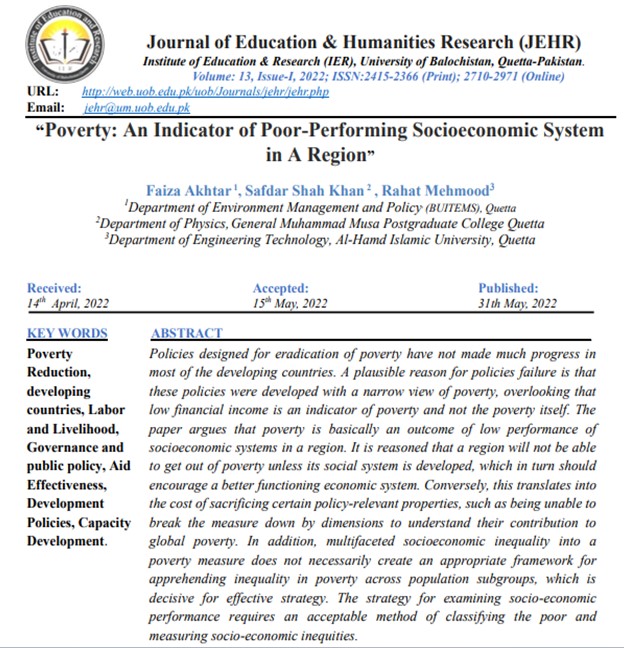Poverty: An Indicator of Poor-Performing Socioeconomic System In A Region
Keywords:
poverty reduction, developing countries, labour and livelihood, governance and public policy, Aid Effectiveness, Development policies, capacity developmentAbstract
Policies designed for eradication of poverty have not made much progress in most of the developing countries. A plausible reason for policies failure is that these policies were developed with a narrow view of poverty, overlooking that low financial income is an indicator of poverty and not the poverty itself. The paper argues that poverty is basically an outcome of low performance of socioeconomic systems in a region. It is reasoned that a region will not be able to get out of poverty unless its social system is developed, which in turn should encourage a better functioning economic system. Conversely, this translates into the cost of sacrificing certain policy-relevant properties, such as being unable to break the measure down by dimensions to understand their contribution to global poverty. In addition, multifaceted socioeconomic inequality into a poverty measure does not necessarily create an appropriate framework for apprehending inequality in poverty across population subgroups, which is decisive for effective strategy. The strategy for examining socio-economic performance requires an acceptable method of classifying the poor and measuring socio-economic inequities.
References
Ahmad, M. and Lodhi, S. (2007). Poverty Reduction: Policies and Global Integration, ISOSS Publications, Lahore, Pakistan.
Ahmad, M., Ahmad, A. and Afzal, S. (2003). Population and Environment. In Population of Pakistan – An Analysis of 1998 Population and Housing Census (Kemal, A.R., Irfan, M. and Mahmood, N.) Pakistan Institute of Development Economics and UNFPA, Islamabad, Pakistan.
AusAID (2001) “Vietnam poverty analysis”, Australian Agency for International Development.
Bontis, N. (2001). “Assessing knowledge assets: A review of the models used to measure intellectual capital”, International Journal of Management Reviews 3(1) : 41-60.
Bontis, N. (2004). “National Intellectual Capital Index: A United Nations initiative for the Arab region”, Journal of Intellectual Capital 5(1) : 13-39.
Certo, C. S. (1997). Modern Management, Prentice Hall International, New Jersey.
DRT and CPA Network (2013) “The 2nd Chronic Poverty Report – Uganda”, Development Research & Training and Chronic Poverty Advisory Network
Edvinsson, L. and Malone, M. (1997). Intellectual Capital - Realizing your company's true value by finding its hidden brainpower, Harper Collins New York.
Emily J. W. (2018) Housing affordability and material hardship: Does affordability measurement matter?, Journal of Poverty, 22:3, 228- 247, DOI: 10.1080/10875549.2017.1419527
Hallegatte, S., Vogt-Schilb, A., Rozenberg, J. (2020). From Poverty to Disaster and Back: a Review of the Literature. EconDisCliCha 4, 223–247. https://doi.org/10.1007/s41885-020-00060-5
HK Government (2013) “Hong Kong Poverty Situation Report 2012” Government of Hong Kong
John, P.R. R. (2020) Estimating Gini Coefficient and FGT Indices in the Philippines Using the Family Income and Expenditure Survey, Journal of Poverty, 24:7, 568-590, DOI: 10.1080/10875549.2020.1737300
Johnson, G. and Scholes, K. (2001). Exploring Corporate Strategy: Text and Cases, FT Prentice Hall.
Kabiru S.A. and Arshad R. (2019). Poverty Alleviation Strategies: A Comparative Study Between Nigeria and Malaysia American Journal of Research. 2019. DOI:10.26739/2573-5616-2019-1-4.
Kalim, R. and Lodhi, S. (2002). “The Knowledge Based Economy: Trends and Implications for Pakistan”, The Pakistan Development Review 41(4) : 787-804.
Kalim, R. and Lodhi, S. (2004). “Digital Economy and its impact on Employment in the Developing Countries”, The ICFAI Journal of Applied Economics – Institute of Chartered Financial Analysts of India.
Kaplan, R. and Norton, D. (1992). “The balanced scorecard - measures that drive performance”, Harvard Business Review 70 (1): 71-9.
Kaplan, R. S and Norton, D. P.(1996). The Balanced Scorecard – Translating Strategy into Action, Harvard Business School Press.
Malhotra, Y. (2003). “Measuring National Knowledge Assets: Conceptual Framework and Analytical Review”, United Nations Department of Economic and Social Affairs, Ad Hoc Expert Group Meeting on Knowledge Systems for Development.
Overstreet, D. (2021) Is Minimum Wage an Effective Anti-Poverty Tool?, Journal of Poverty, 25:5, 453-464, DOI: 10.1080/10875549.2020.1869660
Ozdamar, O. & Giovanis, E. (2021) Youth Multidimensional Poverty and Its Dynamics: Evidence from Selected Countries in the MENA Region, Journal of Poverty, 25:5, 426-452, DOI: 10.1080/10875549.2020.1869658.
Prusak, L. (2001). “Where did knowledge management come from?”, IBM Systems Journal 40 (4): 1002-1007.
Sarracino, F (2008). “Subjective Well-Being in Low Income Countries: positional, relational and social capital components”, Studi e Note di Economia, 13, (3): 449-477
Saunders, P. (2002). The Ends and Means of Welfare. Coping with Economic and Social Change in Australia, Cambridge University Press.
Saunders, P. (2004). “Social Policy Research Towards a Credible Poverty Framework: From Income Poverty to Deprivation”, SPRC Discussion Paper 131.
Singh PK, Chudasama H (2020) Evaluating poverty alleviation strategies in a developing country. PLOS ONE 15(1): e0227176. https://doi.org/10.1371/journal.pone.0227176
Solow, R. (1999). “Notes on Social Capital and Economic Performance”, Journal of Economic Literature 20 (3): 139-154.
Sveiby, K. (1997). The New Organizational Wealth: Managing and Measuring Knowledge Based Assets, San Francisco: Berrett-Koehler.
Sveiby, K. and Roland, S. (2002). “Collaborative climate and effectiveness of knowledge work - an empirical study”, Journal of Knowledge Management 6 (5): 420-433.
UNDP (2003). “Poverty Reduction and Human Rights”, A Practice Note.
UNDP (2006). “Human Development Report 2006”, UNDP.
World Bank (1990). “World Development Report”, World Bank.




